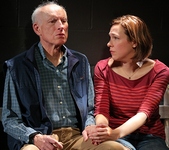SITE GUIDE
REVIEWS
REVIEW ARCHIVES
ADVERTISING AT CURTAINUP
FEATURES
NEWS
Broadway
Off-Broadway
NYC Restaurants
BOOKS and CDs
OTHER PLACES
Berkshires
London
California
New Jersey
DC
Philadelphia
Elsewhere
QUOTES
TKTS
PLAYWRIGHTS' ALBUMS
LETTERS TO EDITOR
FILM
LINKS
MISCELLANEOUS
Free Updates
Masthead
A CurtainUp Review
Too Much, Too Much, Too Many
|
"
I brought someone to visit with you. The new pastor from church, Pastor Hidge, he's come to read to you. Isn't that nice?" — Emma
|

James Rebhorn and Rebecca Henderson
|
What is seventy-five year-old Rose's (Phyllis Somerville) motivation behind her self-imposed, permanent exile to her bedroom? Surely, there must be more to this move to absolute seclusion than the death of her husband James from drowning. As played in flashback scenes by James Rebhorn, we see how James has suffered from increased dementia associated with Alzheimer's.
What was the motivation behind the decision of their attractive, thirty-nine year-old unmarried, live-at-home daughter Emma (Rebecca Henderson) to be the resident care giver to her father? Why would Rose choose to become a recluse, surrounded only by piles of library books? Why would she want to remain a constant and demanding burden to Emma in her mourning? Why would Emma not get professional assistance? It's what happens when Pastor Hidge (Luke Kirby) is sent by the local parish to see what can be done to get Rose out of the bedroom and Emma back into the world that forms the basis of Meghan Kennedy's intriguing but often incomprehensible play.
Despite excellent performances and sensitive direction by Sheryl Kaller, Too Much, Too Much, Too Many is a catch-all for too many unconvincing motives and too many irrational agendas. Whether it was calculated or not, all will leave an audience, with too much time pick at the plot.
As is the mission of the Roundabout Theatre's Black Box productions, this is another play that confirms its faith in an emerging playwright. But in this instance what has emerged is more tantalizing than rewarding. Given the play's quirky and queasy circumstances, the audience is entitled to more than it gets, although Kennedy's gift for honest, even occasionally lyrical dialogue is noteworthy. Wilson Chin's realistic setting sprawls the width of the stage and beyond to depict a kitchen, a bedroom notable for its piles of library books and a bit of the out-of-doors.
Indoors and through the closed door of the bedroom, Emma's daily assignment is reading James's obituary and a portion of the newspaper description of his death: "He had seaweed in his hair. His shirt was tucked in. Belt was still tight. His face was serene." Considering that Emma is not allowed to go into the bedroom and no explanation is forthcoming about food, sanitation, or personal care, we may assume that the stay-out rule is flexible.
Also flexible is the truth behind Pastor Hidge, a wandering man shadowed by his own past. Perhaps it is pointless to wonder how easy it was for this good-looking young Pastor who only recently came to town to secure an appointment at the local parish, let alone be assigned to bring emotional and spiritual support to the two women. Kirby gives a fine performance in which his reading of portions of the Bible through the door sound as sincere as does the baring of his heart to the wary but love-starved Emma. Henderson's wide emotional swings are balanced nicely against Somerville's wistful reveries, often embellished with a lovely smile.
Most impressive is stage veteran Rebhorn who goes out of his mind with pronounced pain and poignancy. The play's title comes from words of love spoken by James to Rose when he romanced her on the lake during their courtship. Except for Rose's one brief glimpse at their relationship, it is a pity that the love they shared was not more evocatively addressed to give credulity and meaning to this otherwise earnest play.
|
Too Much, Too Much, Too Many By Meghan Kennedy Directed by Sheryl Kaller Cast: Phyllis Somerville (Rose), Rebecca Henderson (Emma), Luke Kirby (Pastor Hidge), James Rebhorn (James) Set Design: Wilson Chin Costume Design: Jess Goldstein Lighting Design: Zach Blane Original Music & Sound Design: Broken Chord Running Time: 1 hour 10 minutes no intermission Roundabout's Black Box Theatre at the Harold and Miriam Steinberg Center for Theatre, 11l W. 46th Street. (212)719-1300 Tickets: $20.00 Performances: Tuesday through Sunday evenings at 7:00PM with Saturday and Sunday matinees at 1:30PM. From: 10/25/13 Opened 11/20/13 Ends 01/05/14 Review by Simon Saltzman based on performance 12/10/13 |
|
REVIEW FEEDBACK Highlight one of the responses below and click "copy" or"CTRL+C"
Paste the highlighted text into the subject line (CTRL+ V): Feel free to add detailed comments in the body of the email. . .also the names and emails of any friends to whom you'd like us to forward a copy of this review. For a feed to reviews and features as they are posted add http://curtainupnewlinks.blogspot.com to your reader Curtainup at Facebook . . . Curtainup at Twitter Subscribe to our FREE email updates: E-mail: esommer@curtainup.comesommer@curtainup.com put SUBSCRIBE CURTAINUP EMAIL UPDATE in the subject line and your full name and email address in the body of the message. If you can spare a minute, tell us how you came to CurtainUp and from what part of the country. |

|


 Book of Mormon -CD
Book of Mormon -CD